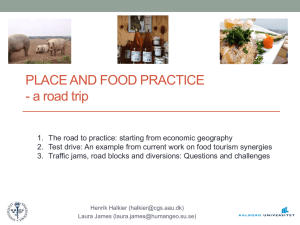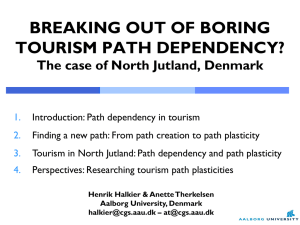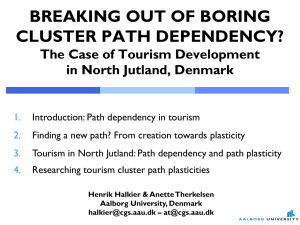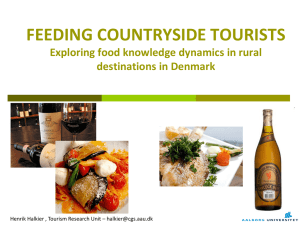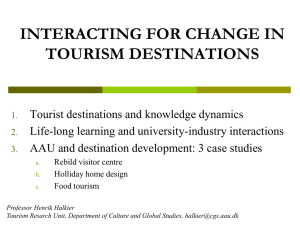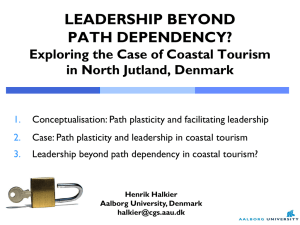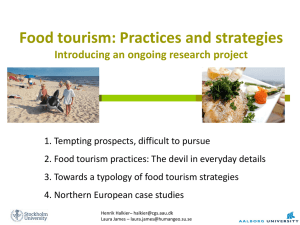Halkier LLAKES Oct 2012 091012
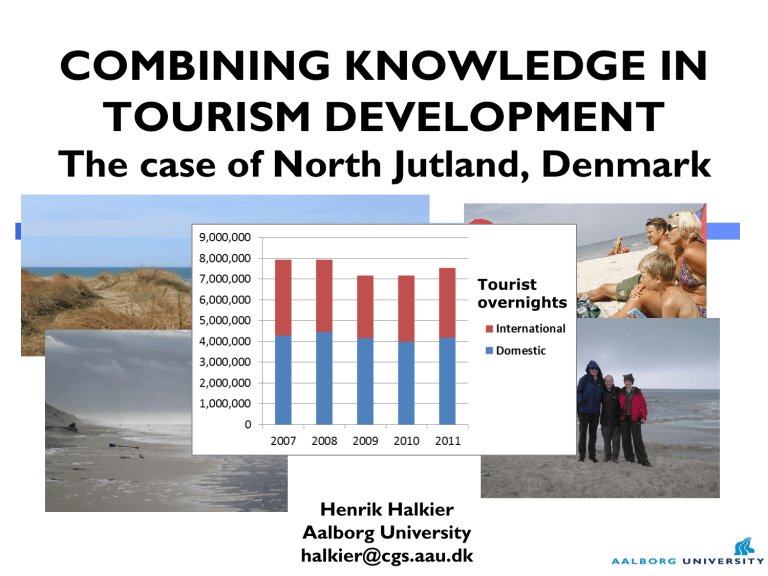
COMBINING KNOWLEDGE IN
TOURISM DEVELOPMENT
The case of North Jutland, Denmark
Tourist overnights
Henrik Halkier
Aalborg University halkier@cgs.aau.dk
COMBINING KNOWLEDGE IN
TOURISM DEVELOPMENT
The case of North Jutland, Denmark
1.
Tourism, innovation and knowledge combination
2.
Analysing knowledge dynamics in tourism
3.
Temperate coastal tourism : A case study
4.
Conclusions and perspectives
Henrik Halkier
Aalborg University halkier@cgs.aau.dk
TOURISM, INNOVATION and
KNOWLEDGE COMBINATION
Limited innovation an oft-repeated claim in tourism research
Small actors with limited resources
Many life-style businesses
Competitive pressure on European destinations growing
Cheap flights, also to far-away destinations
Internet creates new transperancy for experienced travellers
Need to stimulate change through public policy obvious
Refining existing experiences: Cumulative knowledge
New experiences/visitors: Combination of knowledges
Two challenges
Different forms of knowledge
Organisational fragmentation
Henrik Halkier – halkier@cgs.aau.dk
TOURISM, INNOVATION and
KNOWLEDGE COMBINATION
Market intelligence
Conception/ design / marketing
Production
/consumption
Consumption monitoring
Travel services
• commercial
• infrastructural
DESTINATIONS
On-site services
• accommodation
• catering
• transport
Experiences
• prescribed/voluntary
• non-/commercial
Henrik Halkier – halkier@cgs.aau.dk
TOURISM, INNOVATION and
KNOWLEDGE COMBINATION
Symbolic
Market intelligence
Conception/ design / marketing
Synthetic
Production
/consumption
Travel services
• commercial
• infrastructural
DESTINATIONS
On-site services
• accommodation
• catering
• transport
Experiences
• prescribed/voluntary
• non-/commercial
Consumption monitoring
Symbolic
Henrik Halkier – halkier@cgs.aau.dk
ANALYSING KNOWLEDGE DYNAMICS
IN TOURISM
Qualitative approach focusing on
Inter-organisational relations
Creation, acquisition and use of knowledge
Different forms of knowledge
Activity domains: marketing, experience production, service, …
Analytical / Synthetic / symbolic
Tacit / explicit
Discourses on interaction and knowledge dynamics
Henrik Halkier – halkier@cgs.aau.dk
TEMPERATE COASTAL TOURISM
A case study of knowledge combination
Studying destination Top of Denmark, North Jutland
Three municipalities, leading leisure tourism area
Small tourism enterprises, holiday homes, campin
A qualitative longitudinal study (EU FP6 EURODITE)
Three stages of destination development
Organisation Initiatives
1989 Horizontal collaboration between tourism associations
1996 Municipalities and tourism associations create DMO
2007Municipalities and tourism associations sponsor DMO
Henrik Halkier – halkier@cgs.aau.dk
Reservation System
Service
Marketing
Prolonging of season
Product development
Networking within sector
Branding
All-year tourism
Extra-sectoral networking
TEMPERATE COASTAL TOURISM
Knowledge combination, challenges and prospects
Organisation: Mutual dependency in decentralised network
Widespread ownership to small centre via task involvement
Overcoming longstanding competition between localities
Securing local links to small firms
Overcoming public-private divide in knowledge/funding
Knowledge combination gradually increase
Mobilising tacit knowledge of small private firms
Employed in joint promotion/innovation projects
Reaching outside ‘traditional’ sector (attractions, accommodation)
Food to increase attraction and prolong season
External sources of knowledge fairly limited
Caught in VisitDenmark-defined segmented universe
Henrik Halkier – halkier@cgs.aau.dk
COMBINING TOURISM KNOWLEDGE
Conclusions and perspectives
Development and policy challenges
Addressing longstanding organisational-cultural barrier
Inter-local rivalries, public-private
Successful mobilisation of tacit knowledge
for marketing (and development) purposes
Combination of symbolic/synthetic knowledge across domains
Inward-looking knowledge strategies
Interpretative horizon defined by VisitDenmark segmentation
Future research
Intertwining of knowledges and organisations pronounced
Knowledge typologies may be of less importance
Epistemic communities, communities of practice?
Organisational learning literature a source of additional inspiration
Henrik Halkier – halkier@cgs.aau.dk
